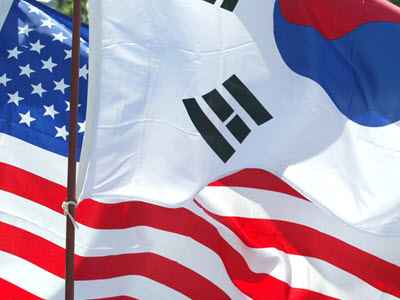Ensuring the U.S.-ROK Energy Alliance
Potential and Prospects
Se Hyun Ahn argues that it is essential for the U.S.-ROK energy security alliance to address the global energy crisis and mitigate global supply chain problems, while also strengthening Indo-Pacific strategic initiatives. This commentary is part of the roundtable “Updating the U.S.-ROK Alliance for New Frontiers.”
Building a strong energy alliance with the United States is South Korea’s most important foreign policy priority and has risen to the top of the country’s energy security agenda in recent years. The Republic of Korea (ROK) and the United States could expand their political and military alliance to include a special energy alliance. Specifically, the two sides could tighten their energy alliance through the increased transfer of U.S. natural gas, crude oil, coal, and renewable energy, as well as the construction of a wide range of energy infrastructure, including nuclear power plants, in third countries. During his recent visit to Washington, D.C., in April, President Yoon Suk-yeol reconfirmed the high level of trust and confidence between the two nations, and energy issues will play a more important role in the growing economic security alliance in the upcoming years.
In fact, energy transactions already constitute more than one-third of the total trade volume between the two nations. According to the Korea National Oil Corporation’s 2022 annual report, U.S. crude oil accounts for 31.8% of South Korea’s commodity imports, and the oil volume is rapidly increasing every year (most recently, by 67% in 2022). Beyond trade, the United States and the ROK cooperate on a variety of energy infrastructure projects all over the world, including technology transfer, co-management of world chokepoints, nuclear power generation and safety, and offshore exploration, among others. The following discussion will survey the emerging ROK-U.S. energy alliance and highlight opportunities to enhance cooperation.
Recommendations to Strengthen ROK-U.S. Energy Cooperation
First, South Korea is in a great position to increase crude oil transfers from the United States mainly due to the Korea-U.S. Free Trade Agreement. South Korea, which was already the world’s fifth-largest crude oil–importing country, became the top destination for U.S. crude oil and liquefied natural gas (LNG) exports in 2021. Conversely, the United States was South Korea’s second-largest source for LNG and crude oil imports, after only Qatar and Saudi Arabia, respectively. Moreover, amid the energy crunch that started in 2021 and was subsequently aggravated by Russia’s invasion of Ukraine, the ROK-U.S. energy alliance, particularly the transfer of LNG, has become even more essential. South Korea and the United States have opportunities to enhance cooperation with each other, especially through global natural gas transactions, to mitigate gas shortages in Europe. For example, they could establish a strategic natural gas reserve system similar to the strategic petroleum reserves.
Second, aside from the natural gas and coal trade, the United States and South Korea also share common interests in developing offshore energy resources in Northeast Asia, specifically, the joint development zone between Japan and the ROK. Located in the East China Sea, this area is considered low-hanging fruit for developing a possible trilateral energy security alliance. But the massive gas reserves are linked to China’s biggest offshore gas field, the Chunxiao gas field, as well as several oil fields. The United States needs to pay close attention to this project, lest China try to use military force under the pretense of protecting its commercial interests. The contract between Japan and South Korea will expire in 2028, and China already has claimed the right to declare this region as its future energy asset.
Third, as the global energy crisis becomes increasingly serious, the United States and the ROK, as the world’s two most advanced countries in terms of nuclear power technology, could cooperate and collaborate with each other in Europe, especially in the Eastern European region, where Russia has cut off the natural gas supply. Poland and the Czech Republic would be perfect areas for both countries to enter and establish joint ventures. To set up nuclear power infrastructure in a third country—whether in the Middle East, Southeast Asia, or Eastern Europe, the United States and ROK should leverage their complementary advantages by pursuing joint ventures. The United States needs private Korean companies that are capable of reliably constructing commercial nuclear power plants in third countries, while South Korea is reliant on the United States to manage nuclear waste and sensitive materials given the restrictions of the nonproliferation regime.
Fourth, Washington and Seoul could collaborate to secure the supply chain of critical mineral resources, which are essential for electric car manufacturing, renewable energy, and high-tech weapons. As the U.S.–China rivalry has intensified, overdependence on China for rare earths has emerged as a grave concern for many countries. In this regard, Seoul and Washington must cooperate on recycling, storage, and innovation to ensure supply of these key mineral resources. Furthermore, the two countries could jointly enter markets in India, Myanmar, and Africa to develop strategic mineral resources as an alternative to Chinese resource materials within the Indo-Pacific strategic framework.
Conclusion
The U.S.-ROK energy security alliance is essential to address the global energy crisis and mitigate global supply chain problems, while also strengthening Indo-Pacific strategic initiatives. A tighter energy alliance could create a more reliable and predictable energy market based on the high level of confidence between the two sides that has accumulated from decades of strong political and military ties.
Se Hyun Ahn is a Professor in the Department of International Relations and the Director of the Center for Energy Security Strategic Studies at the University of Seoul. He is also a member of the Policy Advisory Board of the Republic of Korea President’s Office, Office of National Security.



